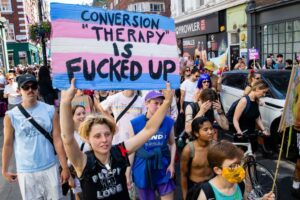When the US astronomer Carl Sagan stated that “extraordinary claims demand extraordinary evidence”, he was riffing on an idea that has influenced the scientific method since the mid-1700s. If we are to conclude extraordinary things, ideas that conflict with what we already think we know, then we need large amounts of quality evidence to justify doing so. The fact that we forgot to apply such basic scientific principles at the Tavistock Gender Identity Development Service (GIDS) is, in and of itself, extraordinary.
Opened in 1989, and closed following a litany of scandals last year, GIDS — the UK’s only specialist service designed to help children questioning their gender and/or identifying as transgender — drew on just one, since widely critiqued, study to underpin its practice. This, despite the fact that it has treated roughly 2,000 young people with hormone blockers and in some cases cross-sex hormones.
“The Dutch Protocol” describes a three-step treatment pathway for children with gender-related distress or incongruence. It starts at the brink of puberty with puberty blockers to prevent the development of secondary sex characteristics, is followed by cross-sex hormones that help to feminise or masculinise appearance, and then concludes with genital and/or breast surgeries in adulthood. The Dutch reported that, after puberty suppression alone, their cohort of 70 young people experienced a reduction in behavioural and emotional problems, decreased symptoms of depression and a significant improvement in functioning. Despite choosing to make medical treatments available to younger children from 2014 anyway, GIDS were not able to replicate the Dutch findings — a fact they didn’t share with the world until 2021.
Given the increasing polarity among professionals on the matter, Dr Hilary Cass, a former President of the Royal College of Paediatrics and Child Health, was employed by the NHS to conduct a review of the published evidence on the use of puberty blockers and cross-sex hormones in children and young people with gender dysphoria. In March 2021, she concluded that they had not been able to find evidence “strong enough to form the basis of a policy position”. It was clear then, at least to those paying attention, that the evidence needed to justify the existing clinical practice in Gids did not exist. And yet, it wasn’t until last month that the NHS announced it would no longer be offering puberty blockers to young people in England and Wales.
Today, as Cass finally publishes the results of her wide-ranging review, the reason seems obvious: her 388-page report concludes that, for most young people, up to the age of 25, “a medical pathway will not be the best way to manage their gender-related distress”. Commenting further on the lack of evidence, she states that not only is there no way for a clinician to accurately determine who will continue to identify as trans for life and who won’t, but that the fundamental rationale for using puberty blockers in the first place “remains unclear”. She speaks of the need to balance medical innovation with the potential “creep of unproven approaches into clinical practice” and calls for the use of “standard evidence-based” interventions instead.
Cass also makes it clear that the factors influencing gender-related distress might be as much social as psychological or biological, with a particular focus on the new cohort of adolescent girls who now make up the majority of gender clinic patients. Instead, she suggests, we need to draw on bio-psycho-social thinking to ensure that future child patients receive the safe and effective care they deserve.
The motivation behind this isn’t hard to glean. The sociological “broken windows” theory hypothesises that, once something becomes damaged just a little, it sends a message that the thing is no longer of value at all, and leads to further vandalism. At heart, the Cass Report is an attempt to prevent this from happening: it punctuates a process that, left unchallenged, might have led to further extraordinary practices creeping into other areas of psychology or medicine.
For those of us working in the field of gender, the influence of social media on adolescent mental health, in multiple and complex ways, has been undeniable. What gets less attention is the impact on us, the adults and professionals. After all, we are just as vulnerable to social influence, including misinformation. One of the factors that has led to the increased demand for medical interventions from gender-distressed young people are the ideas, widely shared on social media platforms as facts, that the medical pathway is not only safe but effective, even life-saving, for all.
Despite the absence of face validity or the long-term data needed for such certainty, some have claimed that regret rates for the surgeries many Gids patients received during early adulthood are lower than for knee surgeries. Yet, as the Cass Report highlights, some of the “facts” shared online are not certainties but myths. Sadly, for example, some young people do later experience profound regret — a reality that Cass acknowledges in her recommendation that “NHS England should ensure there is provision for people considering detransition”.
Yet rather than accept Cass’s rational, evidenced conclusions, a number of professionals and institutions will no doubt continue to argue with certainty that access to medical interventions is both a necessity and a human right. They already call for their colleagues to join them in becoming “practitioner-activists”. Others openly describe their motivation to pursue the medical approach Cass wishes to end as being “based on how passionate we are about the work”. Passion can be a good thing, of course, when aligned to evidence and fact. But when passion becomes untethered to these, or worse tethered to misinformation, it risks transporting us into a troublesome arena. Such an approach has already led to serious lapses in best practice and governance, particularly in relation to the use of puberty blockers for children. The question now is: will such extraordinary practices be able to continue post-Cass?
This is where a sense of concern starts to creep in. For while NHS England has refocused on the need for evidence-based interventions in recent years, some practitioners have already made clear their resistance to this. Last year, we heard that the endocrinologist responsible for prescribing to Gids patients had questioned whether the Cass Review was necessary in the first place. Leaders in the field of clinical psychology have also challenged the need for the review, and splits in the UK’s two psychology associations have been apparent for a while now, with one publicly criticising Cass. Remarkably, as today’s report discloses, the NHS’s adult gender clinics have also set themselves up in opposition to evidence and research, by refusing to participate in the Cass Review’s centrepiece longitudinal research study — an attempt, albeit retrospective, to follow into adulthood the 10,000 young people who’ve been through GIDS’s doors.
In an attempt to explain away such behaviour, some have sympathetically described GIDS as a “justice project”. Yet, in her interim report, published in February 2022, Cass made clear that the implications of GIDS’s approach were far more serious than this: its clinical approach, she wrote, had “not been subjected to some of the usual control measures that are typically applied when new or innovative treatments are introduced”. Just over two years later, she ends her final report by remarking that, while GIDS clinicians were “passionate and wholly committed to their care, [they] had developed a fundamentally different philosophy and approach compared to other paediatric and mental health services”. This deviation from best practice was, in other words, an injustice, and resulted in one group of children receiving less robust standards of care than others.
To mitigate this, Cass invites a return to the ordinary, and an embrace of the scientific method. And this requires sensitivity: after all, understanding why gender-distressed and non-conforming people might have been reluctant to trust ordinary science, medicine and psychology/psychiatry should also be part of the post-mortem to come. Medical approaches and institutions haven’t always been a safe place for them. Sadly, this is not the first time that gender non-conforming people have been considered so different as to require extraordinary treatment. Perhaps Cass’s recommendation to offer regular treatments to our distressed, but still ordinary, children and young people is where the true justice will begin.
Disclaimer
Some of the posts we share are controversial and we do not necessarily agree with them in the whole extend. Sometimes we agree with the content or part of it but we do not agree with the narration or language. Nevertheless we find them somehow interesting, valuable and/or informative or we share them, because we strongly believe in freedom of speech, free press and journalism. We strongly encourage you to have a critical approach to all the content, do your own research and analysis to build your own opinion.
We would be glad to have your feedback.
Source: UnHerd Read the original article here: https://unherd.com/



